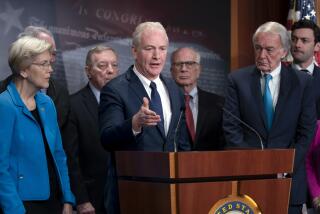Cohen Urges Japan to Ratify Guidelines for Military Aid
- Share via
TOKYO — Amid rising political tensions on the Korean peninsula, Defense Secretary William S. Cohen urged Japanese leaders Thursday to get parliament moving on guidelines that would enable Japan to back up the United States in military conflicts in the Asia-Pacific region.
But long-stalled action on the guidelines--which were signed by the two countries in September 1997 but still require approval by parliament--is no slam-dunk. Japan’s “peace constitution” contains a clause renouncing war, although the country maintains its Self-Defense Forces for what it calls “exclusively defensive” purposes.
The guidelines call for Japan to help out Washington during any war in the region by providing assistance such as water and fuel and allowing U.S. planes to land at its civilian airports.
Cohen’s pleas to senior Japanese leaders came 4 1/2 months after North Korea launched a rocket that flew over Japan. The rogue nation is also believed to be building an underground nuclear weapons facility that the U.S. wants to inspect. At one point, North Korea demanded $300 million for access.
The rocket incident added momentum to Cohen’s nudging.
“That one missile played a big role,” said John Neuffer, a political analyst at Mitsui Marine Research Institute, a Tokyo think tank. “It became very clear that they had to get those guidelines through. They didn’t want to be stuck with legislation to implement guidelines with a crisis breaking out on the Korean peninsula.
“U.S. government officials want as many [Japanese political] parties signing on to the guidelines as possible. They don’t want grudging approval. They want it to look like a strong mandate to move forward.”
In addition to Cohen’s lobbying for the guidelines, jostling among Japan’s political parties is likely to spur action on the issue, several government officials said. The ruling Liberal Democratic Party, which supports the guidelines, forged a coalition Thursday with the relatively small Liberal Party led by LDP defector Ichiro Ozawa.
Ozawa, the reform-minded politician whose ideas in the past have been championed by the U.S., has long supported Japan taking a stronger position in international peacekeeping operations.
Although Ozawa’s Liberal Party is very small, with just 50 of the 752 seats in the two houses of parliament, its votes will bring the new coalition closer to a majority in the upper house; the Liberal Democrats already control the lower house.
In forming the coalition, the two parties compromised on the issue of participation in peacekeeping operations, but only those that don’t involve “military action.” Nevertheless, it is far from a done deal: They are still quibbling about the definition of “military action.”
On the guidelines issue, the two parties appeared to have made even less progress in the weeks of negotiations leading up to Thursday’s alliance.
Ozawa has called for making the guidelines far more specific; right now, they have vague wording that calls for backup assistance to “areas surrounding Japan.” Some have wondered if this includes the Taiwan Strait, for example.
Japan should provide assistance only when “our country’s situation affects our peace and safety,” Ozawa told reporters Thursday afternoon. Whether the two parties came up with a compromise wasn’t clear.
“I believe they have understood our side,” Ozawa said. But he noted that even though his party has formed the coalition, “it doesn’t mean we’re going to bend our demands. That’s not going to happen.”
More to Read
Sign up for Essential California
The most important California stories and recommendations in your inbox every morning.
You may occasionally receive promotional content from the Los Angeles Times.













